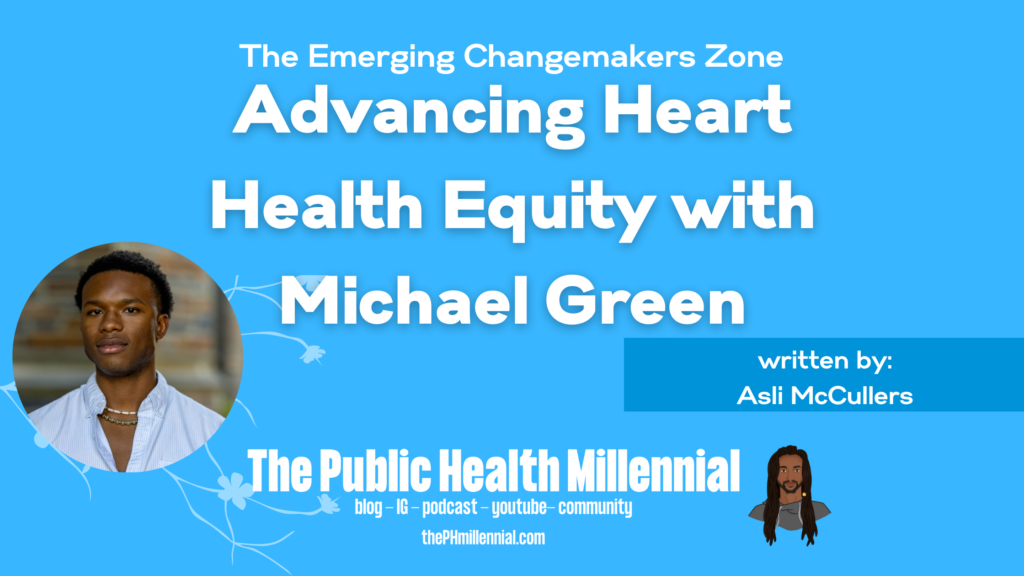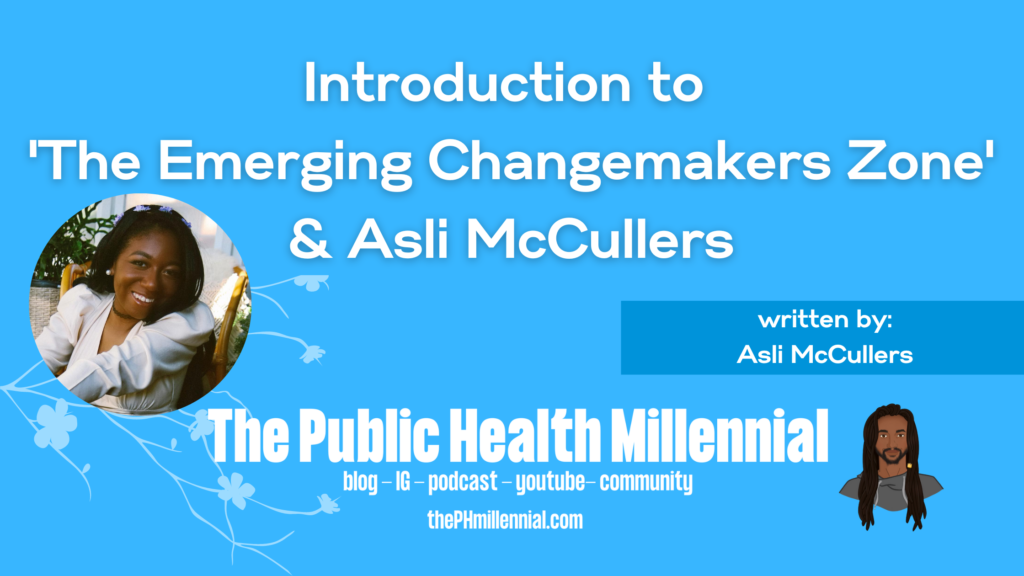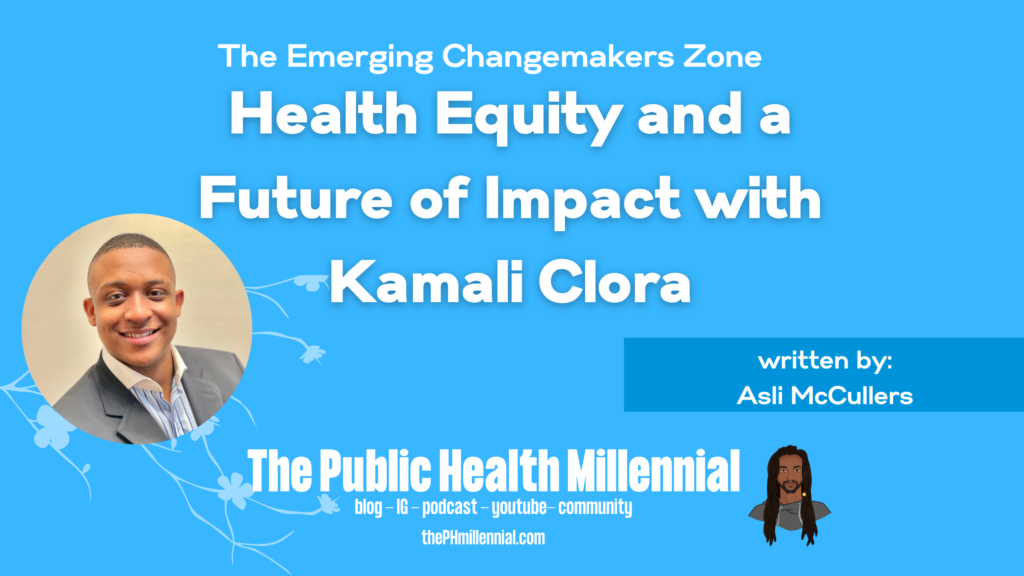Introduction
What factors are shaping your interests in pursuing a career in health equity? Michael is a Doctor of Philosophy (PhD) Student in Population Health Sciences at Duke University. He previously earned his Bachelor’s degree at Dartmouth College, where he studied Anthropology with a minor in Environmental Sciences. This conversation covers how family, upbringing, interests and other elements of lived experiences have shaped his journey in addressing cardiometabolic health inequities.
Finding “Heart” In Health: The Role of Family in Michael’s Public Health Journey
My conversation with Michael began with discussing his initial roots of interest in pursuing a career in public health research and health equity. He shared with me how these seeds were planted from dynamics in his family, and how health was an important topic and display of unity, connection and care.
“I went into undergrad thinking that I was potentially going to pursue more clinical medicine…like, a medical doctor, or being more on the intervention side of things, particularly because that’s kind of all I was exposed to. My mother is a physician, and despite her and my father not being together…she was the only one, to this day, who really provides much medical advice for people on my father’s side of the family. And so I thought that was kind of like–Huh? …. If my mom’s the [only] one who can provide advice for even my father’s side of the family, there’s probably a need amongst other people who look like me… so I identified the need within healthcare, and that drew me to healthcare and medicine also in the same vein.”
Continuing on with the theme of family influence, Michael shared that the burden of chronic diseases for his family members strengthened his interest in stepping into cardiometabolic health equity with a personal lens. He shared, “A lot of people in my family have chronic conditions. So, thinking about hypertension. diabetes, a lot of the different cardiometabolic conditions that affect overall heart health. Those are things that have been really prevalent within my family, so that drew my general interest there.”
Like many of us emerging changemakers, Michael began his studies doing some soul searching to find his best academic fit during his undergrad years at Dartmouth College. His journey included dabbles in the standard pre-medical curriculum, as well as biomedical
engineering before finding his way to Anthropology. As an Anthropology major, He was introduced to the analysis of health care from a patient-oriented perspective, as well as the way that individuals interact with the health care system. Revisiting the family element, he shared,
“My family members have mentioned that they have struggled with medical knowledge. They’ve struggled with how they felt in the hospital, and so that’s really kind of informed my passion to like when I go into this field.”
I deeply appreciated the role that family and community plays in Michael’s motivation for health equity work—in one of the previous interviews, I talked about how frequently in this work, we use the term “population level” or “population health”. However, it’s certainly okay for our immediate families, or even just one person, to be our personal drivers and our “why”.
“Rowing” Forward: Michael’s Academic Experience at Dartmouth and Movement Toward Health Equity
Michael and I shared some laughs along with powerful insights while discussing how both environment and involvement during undergrad can play a pivotal role in building footing for post-undergrad transitions. For people coming from minoritized or marginalized backgrounds, navigating an Ivy-league space can be unique and sometimes challenging. On his experience at Dartmouth, Michael recalled;
“I definitely feel like there was some kind of impostor syndrome. I went to public high school. And a lot of people coming [to Dartmouth] were from really elite boarding schools where they were paying, like, college tuition to go to like high school, which is something I didn’t know happened.”
Michael faced obstacles of microaggressions, privilege and location (with Dartmouth being very far from the nearest major city AND cold, us both being from Maryland, lol) head on, and leaned into his own personal confidence, beliefs in his abilities and willingness to learn from others to be successful at Dartmouth. He shared;
“…at times I was like…Wow! A lot of people here are pretty spectacular, coming from this position that I didn’t necessarily come from. But then, also, I have my own unique contributions to those spaces, too. And so, I think that it’s not just about the different perspectives, but I think that effort is something that you can always put forward—you’re not going to be the best at everything in every single class. But I think that’s kind of the thing…working on learning how to work on an interdisciplinary team.”
Michael also spoke honestly about how the environment at Dartmouth was likely the best for him at that time, sharing that being far from home and the energy being low-distraction encouraged him to stay focused on school work. We also talked about how with school, there’s also always opportunity for (healthy!) fun during undergrad–like camaraderie and leadership building in athletics. Michael was a Varsity rower in college, a sport that he walked-onto without prior experience. He has fond memories of how the discipline and teamwork from that experience play a role in his current skills as a health equity researcher. He shared:
“I actually have worked on equity and inclusion work in the rowing space, before I even was doing more equity research in healthcare like. equity has always been kind of the center of my interest…like with the George Pocock Rowing Foundation, we worked on creating scholarships for people to actually participate in the sport, and I think that kind of ties it all together. I thought about the community that rowing gave me within my undergrad experience, and thinking about the opportunities to provide people to go to school, because a lot of great schools have rowing and offer preferential admission for people to get into these institutions that have a lot of great resources. I think you can learn a lot of great lessons through sport, or just doing something that takes discipline.”Rowing is a sport that I was fairly unfamiliar with before our conversation, so it was super interesting to see how equity conversations can be woven into such a dynamic array of spaces–including our extracurricular activities. I’ve engaged in some of that dynamic DEI work myself as a former marching band member, and have been doing work with the Performing Arts Initiative for Students of Color for a few years! Michael is continuing this mission, and is still involved in rowing as a coach down in North Carolina!
Recommendations for Pursuing Health Equity Focused Programs
Michael knew from a relatively early point in his career that he was ready to go for his doctorate degree–in fact, he transitioned directly from his Bachelors program at Dartmouth to his current position as a doctoral student at the Duke University School of Medicine! Check out some of his thoughts on the process and best practices for picking a program as a scholar without a masters interested in a PhD with research foci in health equity.
- Solid Mentorship: Encouragement from his mentors to “just go for it” is one of the main reasons Michael knew he was ready to apply directly to PhD programs at the close of his undergraduate years. He shares, “I was debating between whether I wanted to go straight into a job, or if I wanted to go into graduate school. And then I was first primarily thinking about a Master’s degree. It’s 1.) because some Phd programs don’t accept you if you don’t have a master’s degree and 2,.) I just didn’t know if I was really ready to go all in yet, and then I had a conversation with my mentor and some other people in our team. They were like, actually, Michael, like you have a publication. You have research experience–that’s really valuable and in terms of the applicant pools, like you would be someone who would be a candidate for [PhD Programs].”
- Self-Assuredness: By the end of undergrad, Michael had already spent plenty of time working as a research assistant (4 years), already having published peer reviewed work, solidifying his personal interest in quantitative methods and health equity. He shared; “I didn’t feel I needed to go to a masters program to find out more about what I wanted to do. I was pretty certain, in the area that I wanted to focus within…I probably would have chosen a master’s program if I was like, ‘I really need this time to like have more time for myself to be exposed to a few more things before I dive into the like intensive process of being within a PhD program’”
- Knowing Your Needs: Picking a doctoral program is related to so many factors that expand beyond what we look for in undergraduate or even masters programs. Funding, as Michael mentioned, is critical, as well as overall research match and faculty support. In his experience, Michael gave the following insight; “you find out a lot about yourself when you’re doing a PhD program, because I feel like in undergrad, you could kind of be like, oh, -maybe I like this, and not like this. But for a PhD– this is like my next 4 to 5 years. I need to really be like not compromising on if this is what I really like? Am I trying to just fit a square peg in a round hole? Do I actually think this is a great fit?”
Michael’s advice couldn’t come at better timing for me–I just committed to my PhD program and these are truly important things to consider (more on that in a later blog post!).
As always, my favorite question to ask our changemakers is ultimately, what impact they hope to bring to the world through health equity. Michael shared the following powerful thoughts; “I want to be in a position where I feel comfortable [retiring], because I’ve trained enough people to also … continue the work going forward. I think that’s something that’s kind of [the] appeal of academia is not just having autonomy over my career, but also the people you can impact. I could write the best paper that gets in the best journals. I could do great community engaged work myself. I can get tons of great grant funding. I could get all the accolades I want… and I still wouldn’t be able to accomplish everything I want to do without the lasting impact of being a great mentor, and being a great teacher as well. So, I think the metrics that I really care about are the success of the people that I work with”
HUGE thank you again to Michael for this amazing conversation (and for his patience with me–we had to re-record the entire interview, lol!)! It was so awesome to learn about his interests and your journey, and I know that he will continue to make incredible strides in cardiometabolic health equity research! 😊
Connect with Michael on Linkedin or Twitter @thoughts_by_MDG and share this with a student interested in health equity work!



